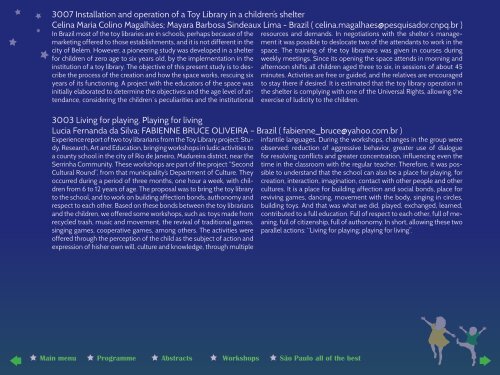Programa completo do Congresso - Associação Brasileira de ...
Programa completo do Congresso - Associação Brasileira de ...
Programa completo do Congresso - Associação Brasileira de ...
Create successful ePaper yourself
Turn your PDF publications into a flip-book with our unique Google optimized e-Paper software.
3007 Installation and operation of a Toy Library in a children’s shelter<br />
Celina Maria Colino Magalhães; Mayara Barbosa Sin<strong>de</strong>aux Lima - Brazil ( celina.magalhaes@pesquisa<strong>do</strong>r.cnpq.br )<br />
In Brazil most of the toy libraries are in schools, perhaps because of the<br />
marketing offered to those establishments, and it is not different in the<br />
city of Belém. However, a pioneering study was <strong>de</strong>veloped in a shelter<br />
for children of zero age to six years old, by the implementation in the<br />
institution of a toy library. The objective of this present study is to <strong>de</strong>scribe<br />
the process of the creation and how the space works, rescuing six<br />
years of its functioning. A project with the educators of the space was<br />
initially elaborated to <strong>de</strong>termine the objectives and the age level of attendance,<br />
consi<strong>de</strong>ring the children´s peculiarities and the institutional<br />
resources and <strong>de</strong>mands. In negotiations with the shelter´s management<br />
it was possible to <strong>de</strong>slocate two of the attendants to work in the<br />
space. The training of the toy librarians was given in courses during<br />
weekly meetings. Since its opening the space attends in morning and<br />
afternoon shifts all children aged three to six, in sessions of about 45<br />
minutes. Activities are free or gui<strong>de</strong>d, and the relatives are encouraged<br />
to stay there if <strong>de</strong>sired. It is estimated that the toy library operation in<br />
the shelter is complying with one of the Universal Rights, allowing the<br />
exercise of ludicity to the children.<br />
3003 Living for playing. Playing for living<br />
Lucia Fernanda da Silva; FABIENNE BRUCE OLIVEIRA – Brazil ( fabienne_bruce@yahoo.com.br )<br />
Experience report of two toy librarians from the Toy Library project: Study,<br />
Research, Art and Education, bringing workshops in ludic activities to<br />
a county school in the city of Rio <strong>de</strong> Janeiro, Madureira district, near the<br />
Serrinha Community. These workshops are part of the project “Second<br />
Cultural Round”, from that municipality’s Department of Culture. They<br />
occurred during a period of three months, one hour a week, with children<br />
from 6 to 12 years of age. The proposal was to bring the toy library<br />
to the school, and to work on building affection bonds, authonomy and<br />
respect to each other. Based on these bonds between the toy librarians<br />
and the children, we offered some workshops, such as: toys ma<strong>de</strong> from<br />
recycled trash, music and movement, the revival of traditional games,<br />
singing games, cooperative games, among others. The activities were<br />
offered through the perception of the child as the subject of action and<br />
expression of hisher own will, culture and knowledge, through multiple<br />
infantile languages. During the workshops, changes in the group were<br />
observed: reduction of aggressive behavior, greater use of dialogue<br />
for resolving conflicts and greater concentration, influencing even the<br />
time in the classroom with the regular teacher. Therefore, it was possible<br />
to un<strong>de</strong>rstand that the school can also be a place for playing, for<br />
creation, interaction, imagination, contact with other people and other<br />
cultures. It is a place for building affection and social bonds, place for<br />
reviving games, dancing, movement with the body, singing in circles,<br />
building toys. And that was what we did, played, exchanged, learned,<br />
contributed to a full education. Full of respect to each other, full of meaning,<br />
full of citizenship, full of authonomy. In short, allowing these two<br />
parallel actions: “Living for playing; playing for living”.<br />
Main menu Programme Abstracts Workshops São Paulo all of the best


